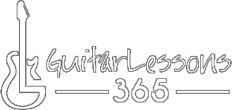Understanding And Writing Major Key Chord Progressions Pt.2
This lesson is the video portion of our series on understanding and writing major key chord progressions.
Using the material from the tutorial PDF available in the theory section, plus your knowledge of the Major and Minor chords using the CAGED Sequence, we are now able to begin to construct some chord progressions on the guitar.
If you haven't read part one and/or you don't know your major and minor chords using the CAGED Sequence, make sure you review those lessons because they are all available here on the site.
The key here is to just experiment and get used to writing your own thing and seeing the chords that you play on the guitar as part of a key and not just some random chord. You want to start to think like a musician.
This video lesson should be pretty easy for the people who have completed the part one PDF and know their Major and Minor chords well.
In the very near future we will do the same type of lesson but this time with seventh chords. WOOHOO!!
If these free lessons help you, please donate to keep new ones coming daily. Thanks!! 🙂
Understanding And Writing Major Key Chord Progressions
13 Comments
Leave a Comment
You must be logged in to post a comment.
 Skip to content
Skip to content
muy buena la pagina, buena info, buena energia…:)
Really liked the first lesson on major chord progressions. Its what I need to get away from just playing everyone else’s music! Thank you very much for making this available to everyone, I will continue to take the lessons. I also will definitely make a donation to your site. Keep it up!
nice work! really good lessons. Suggestion: tag the time of the reminders of reading your pdf’s, so the people that really know how to study with your videos, know from wich part of the video start with.
goods vibes from chile
i like it,wonderful lesson
Thanks for making this! Ill learn a lot! God bless you
Hey, you are awesome 🙂 i’ve been playing since i was 15 now im 17, but i haven’t really been studying these kinds of things. soo thank you for this website, the only problem is, the lessons are all mixed up. lol.
Oh, and wheres the part one thing youre talking about?
“If you haven’t read PART ONE and/or you don’t know your major and minor chords using the CAGED Sequence, make sure you review those lessons because they are all available here on the site.”
great lesson but I cannot find the pdf….no theory section is listed.
Hey James, just click on the blue “theory lessons” link in this lesson’s description. That will take you straight to the Theory Lessons Archive. 🙂
Cheers! Carl..
That CAGED System G Shape is insane 😀 i have to use my right hand to put the fingers into place. Nothing really new for me in this video but it s really good, keep it up!
Hey Carl I had a question. So if i’m writing a major chord progression so I use the layout maj, mi, mi, maj, maj, mi, dim. And I switch lets say the key G so G maj, and switch to its relative minor E min. So would I keep that same major chord progression layout as I’m in the new minor key, or would I switch to the minor chord progression layout? This would help me a lot thank you.
Hey Billy, yeah you would switch to the minor chord layout when you switch keys.
Many songs temporarily modulate into their relative major or minor keys only to return to the original key. Ie (verse in minor modulating to it’s relative major for the chorus).
Also, keep in mind that when you modulate to the relative minor you can actually pull chords from all 3 minor scales (harmonic, melodic and natural).
For example, when playing a song in G major when you modulate to E minor you would use chords from E harmonic minor, E melodic minor and E natural minor.
Make sense? There is a theory tutorial on the site explaining minor keys that I think would help you out a bit.
Carl…
Thank you so much bud this helped immensely! (: Yeah I read it awhile back maybe like 3 months ago, but now that I starting to use other keys within a progression I should probably reread it.
Thanks, There are a lot of other lessons on the next, but I feel many of them are either on meth or have bipolar disorder Thanks, you are logical, clear, intelligent, and a great teacher-and guitar player- thanks a bundle